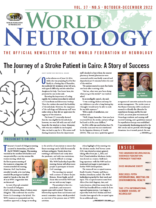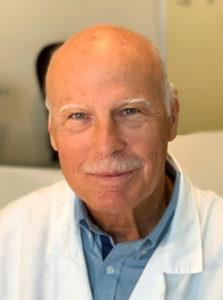
Grisold
This year’s Council of Delegates meeting occurred in Amsterdam, just before the ECTRIMS Congress. The meeting was held at the excellent RAI facilities and was preceded by a one-day seminar-like trustee meeting, which was the first in-person meeting of the trustees in a long time. All trustees attended the meeting. However, Prof. Guy Rouleau attended virtually, as he was being awarded the prestigious Gairdner award in Canada at the time. All of us at WFN congratulate him on this award.
In total, 60 people attended the Council of Delegates (CoD), 20 in person, three of whom were delegates. This confirmed the need for future CoD meetings to be hybrid. The WFN trustees recommended and the members approved, a change in wording to the articles of association to ensure that future meetings can be held electronically without ambiguity. Trends show that traveling is still limited and costly since the pandemic, and with visa restrictions, it can be difficult to arrange. The WFN leadership hopes this meeting format will allow more people to participate in future CoD meetings.
The meeting was opened with a minute of silence for Jun Kimura, Ettore Beghi, and all those who served the WFN and are not with us any longer.
The president’s, first vice president’s, and treasurer’s reports were well received. They were followed by reports from each trustee and several committee chairs, which provided an overview of the present state of WFN activities.
A key highlight of the meeting was the election results. Prof Steven Lewis (U.S.) was elected secretary general, taking office from Jan. 1, 2023, and Prof. Chandrashekhar Meshram (India) was elected as a trustee. Both have long experience with the WFN and are motivated and eager to participate in further WFN developments.
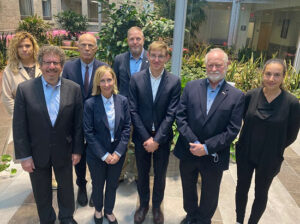
The WCN site visit team in Montreal. From left to right: Maya Smith, Steven Lewis, Wolfgang Grisold, Anne-Louise Lafontaine, Marcel Dekker, Steven Peters, Guy Rouleau, Karine Garneau
The terms of two co-opted trustees, Riadh Gouider (Tunisia) and Marco Medina (Honduras) ended. The WFN leadership is grateful for their work and input. The co-opted trustees came from Africa (Pan-Arab Region), Asia, and Latin America, which has meant that the WFN has benefitted from a wide de facto regional representation. I am happy to report that both Prof. Medina and Prof. Gouider have agreed to be co-opted again for an additional term.
The WFN will continue to seek a wide geographic diversity on the Board of Trustees. In addition, quarterly meetings are planned with the leadership of the regions (AAN, EAN, AFAN, PAUNS, PAFNS, and AOAN) to ensure wide regional influence in WFN.
IGAP
The Intersectoral Global Action Plan (IGAP) and its implementation worldwide is of much interest and was emphasized during the CoD. Alla Guekht reported on this and the importance of the WFN’s cooperation with the WHO.
In a follow-up WHO meeting on IGAP, the WFN and ILAE were asked to provide joint proposals to the WHO on implementation. A small working group consisting of Helen Cross, ILAE president; Julie Hall, ILAE executive director; Kimberly Karlshoej, WFN strategy and program director; and me have created a general statement and are working on a series of joint webinars to introduce important elements of IGAP to member societies and the wider public.
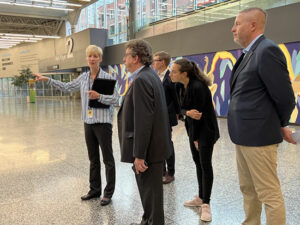
Site visit team inside the congress center, in the large multipurpose hall.
WFN has agreed to fund the WHO’s Brain Health Unit to employ a consultant for one year to work on the implementation of IGAP and to develop an implementation toolkit. The trustees are convinced that supporting WHO in this activity is crucial.
In summary, IGAP’s 10-year timeline aims to implement neurology at country-level. It is an ambitious project and a unique opportunity for neurology and neurologists with benefits for patients and carers. We will continue to keep WFN Member Societies informed about progress.
Member Societies
The AFAN Congress and the Regional Teaching Course were financially supported by the WFN. In addition, the trustees have participated in several meetings. For example, we attended and had joint meetings with the World Stroke Organization in Singapore; the Mexican Academy of Neurology, León; and the Indian Academy of Neurology as well as the AOAN in Delhi. I was honored to give the Dr. Gilberto Gomez Memorial Lecture at the Philippine Neurological Association Annual Convention and was on the panel for the launch of the Optimizing Brain Health Across the Life Course: WHO position paper.
The WFN appreciates every opportunity to participate in and contribute to WFN member societies’ meetings. All regular communication between the WFN and our member societies is valued, and we believe it helps to improve brain health and quality neurology.
Educational Activities

The Palais des congrès de Montréal at night.
The educational activities of the WFN continue, and the Education Committee and several subcommittees have been appointed. Current priorities are creating a core curriculum, a practical global neurology training blueprint, addressing the minimal required knowledge, clinical and technical skills, and overall competencies for neurologists, while recognizing regional variations in resources, funding, and spectrum of diseases. The needs of faculty, trainers, and the structure of the teaching facility will be included.
WFN has also appointed a Young Neurologist Subcommittee. At the World Congress in Montreal, the subcommittee is hosting two sessions created for other young neurologists. It is the strong wish of the WFN to inspire and empower young neurologists in their education around the globe.
eLearning
The WFN and AFAN will continue the highly successful eLearning Day next year, and WFN plans a joint AFAN and International Headache Society eLearning Day on headaches in 2023.
World Congress
Organizing the World Congress of Neurology is an enormous task. In September, we did the first site visit to the excellent facilities with the engaged local team. We look forward to seeing you all in Montréal in October 2023. •
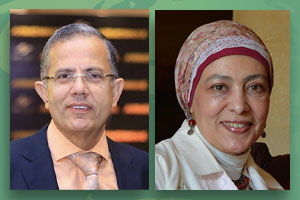
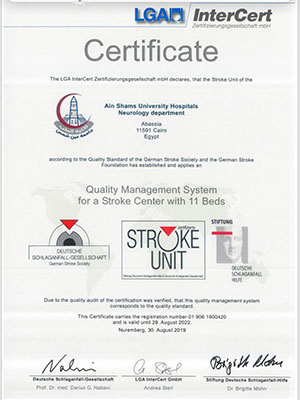
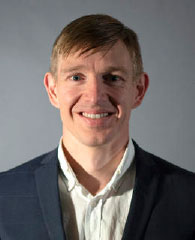
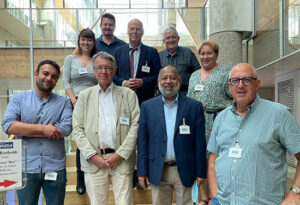 This year’s meeting on environmental health took place over two days and in a hybrid format in order to allow active participation unencumbered by travel. Participants and speakers from all over the world were able to gather, report findings as well as discuss relevant topics. Day 1 included sessions on neurotoxicology, exposure science, and the clinical approach of exposure sciences. Day 2 included neurological impacts of climate change, health impacts of air pollution, long COVID as well as diseases and environmental risk factors.
This year’s meeting on environmental health took place over two days and in a hybrid format in order to allow active participation unencumbered by travel. Participants and speakers from all over the world were able to gather, report findings as well as discuss relevant topics. Day 1 included sessions on neurotoxicology, exposure science, and the clinical approach of exposure sciences. Day 2 included neurological impacts of climate change, health impacts of air pollution, long COVID as well as diseases and environmental risk factors. The 17th International Summer School of Neurology took place July 8-10, 2022, and was organized as a hybrid event. This educational activity along with the Fifth Teaching Course on Rare Neurological Diseases, brought together a lively audience of over 1,400 participants in a hybrid format, both online and on-site. In addition, the 3-day event hosted an online parallel session, “Psychiatry Perspectives in Neurocognitive Disorders” and a satellite session (on-site, on the shores of the Black Sea in Romania), focused on clinical case studies. This session was coordinated by Prof. Raad Shakir (UK), CBE, former World Federation of Neurology (WFN) president. The event was organized by Prof. Dafin Muresanu (Romania) and presided over by well-established international specialists, such as WFN President Wolfgang Grisold (Austria), Natan Bornstein (Israel), Volker Homberg (Germany), and Raad Shakir (UK). In addition, the events featured strong collaboration and endorsement from the World Federation of Neurology (WFN), the World Federation of Neurorehabilitation (WFNR), the European Federation of Neurorehabilitation Societies (EFNR), and the European Academy of Neurology (EAN), among other institutions.
The 17th International Summer School of Neurology took place July 8-10, 2022, and was organized as a hybrid event. This educational activity along with the Fifth Teaching Course on Rare Neurological Diseases, brought together a lively audience of over 1,400 participants in a hybrid format, both online and on-site. In addition, the 3-day event hosted an online parallel session, “Psychiatry Perspectives in Neurocognitive Disorders” and a satellite session (on-site, on the shores of the Black Sea in Romania), focused on clinical case studies. This session was coordinated by Prof. Raad Shakir (UK), CBE, former World Federation of Neurology (WFN) president. The event was organized by Prof. Dafin Muresanu (Romania) and presided over by well-established international specialists, such as WFN President Wolfgang Grisold (Austria), Natan Bornstein (Israel), Volker Homberg (Germany), and Raad Shakir (UK). In addition, the events featured strong collaboration and endorsement from the World Federation of Neurology (WFN), the World Federation of Neurorehabilitation (WFNR), the European Federation of Neurorehabilitation Societies (EFNR), and the European Academy of Neurology (EAN), among other institutions.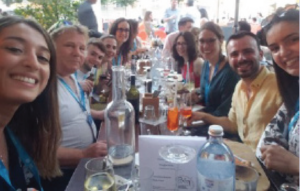 Thanks to World Federation of Neurology, I had the opportunity to attend the Eighth European Academy of Neurology Congress June 25-28, 2022, in Vienna Austria.
Thanks to World Federation of Neurology, I had the opportunity to attend the Eighth European Academy of Neurology Congress June 25-28, 2022, in Vienna Austria.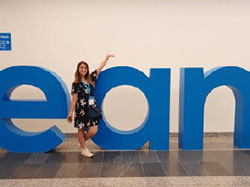 During the three days of the conference, I was in sessions revolving around different interesting topics in the field. I am highly interested in inflammatory diseases, and thanks to this opportunity I was able to attend multiple sclerosis discussions. The highlight of my journey was the plenary symposium about improving lives and reducing burden. It was interesting to me as a medical doctor from a low-income country.
During the three days of the conference, I was in sessions revolving around different interesting topics in the field. I am highly interested in inflammatory diseases, and thanks to this opportunity I was able to attend multiple sclerosis discussions. The highlight of my journey was the plenary symposium about improving lives and reducing burden. It was interesting to me as a medical doctor from a low-income country.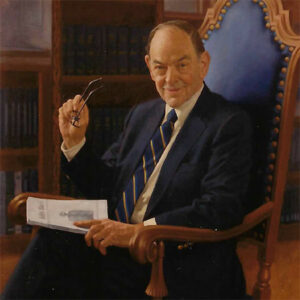 When Arthur K. Asbury, Van Meter professor of neurology emeritus at the Perelman School of Medicine of the University of Pennsylvania, died on Oct. 19, 2022, at the age of 93, the neurologic world lost a true giant, and many of us lost a friend and mentor.
When Arthur K. Asbury, Van Meter professor of neurology emeritus at the Perelman School of Medicine of the University of Pennsylvania, died on Oct. 19, 2022, at the age of 93, the neurologic world lost a true giant, and many of us lost a friend and mentor.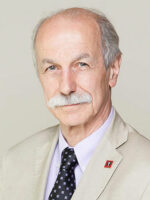
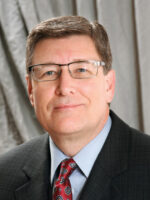
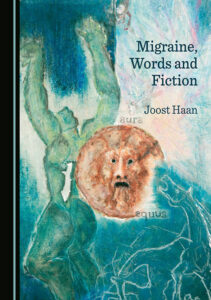 There is no objective test for migraine. Migraine cannot be proven with a scan, blood test, or EEG. The neurological examination during and outside attacks is usually normal. A diagnosis of “migraine” can only be made on the words with which patients describe past experiences. Their words must be “read” to get a diagnosis. Based on sparse, remembered, and metaphorical information, doctors worldwide make a diagnosis of migraine to distinguish it from, for example, tension-type headaches, a diagnosis that is also based on words.
There is no objective test for migraine. Migraine cannot be proven with a scan, blood test, or EEG. The neurological examination during and outside attacks is usually normal. A diagnosis of “migraine” can only be made on the words with which patients describe past experiences. Their words must be “read” to get a diagnosis. Based on sparse, remembered, and metaphorical information, doctors worldwide make a diagnosis of migraine to distinguish it from, for example, tension-type headaches, a diagnosis that is also based on words.